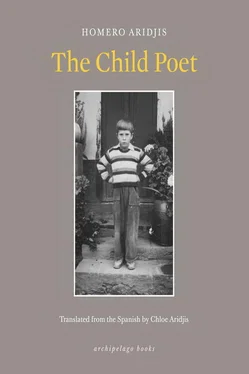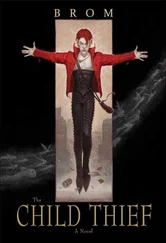The following day he showed up at the store with the face of someone who’s had a bad night and stood outside, the sun fracturing his shadow on the stones, while sparrows at his feet pecked at the earth, sending up dust.
He was wearing white trousers and the navy blue jacket. He’d powdered his cheeks to cover up his wrinkles and seemed to be having trouble keeping his eyes open in the blinding light.
My aunt arrived at nine. Quickening her step she entered the store and went to the back without turning around, until she was nearly hidden behind the counter. Nothing was farther from her offended face, so like that of a neglected patient, than a smile.
Resembling an unpenned bull ready to charge, she ignored me and my father, mindful only of the door.
Her face half covered by a black shawl, she leaned on her elbows next to the cookie cabinet, where two yellow cats were watching her.
The Generalito came inside looking for her but turned pale when he saw her glaring at him.
Nevertheless, he drew near. He leaned on the counter and spoke to her in a rush, like someone who wants to say everything he’s been thinking about for months during the first meeting:
“You must know that I can’t live without you any longer … And that I spend sleepless nights in Nogales … And that I receive every letter of yours with a trembling hand,” etc.
My aunt, her intent reader’s eyes fastened on the opening and closing of his lips, not missing a word, interrupted him in the loud voice of the deaf:
“This is just what I want to talk to you about. It’s embarrassing me how ridiculous you are. Remove yourself from my presence, because I don’t love you.”
She pulled the shawl over her mouth angrily, indicating she had nothing further to say. And strode out of the store, her eyes throwing sparks.
The Generalito continued to lean on the counter, his hair unkempt, his jacket wrinkled, his shirttails hanging out, and his face pasty, the confusion of the moment having completely disheveled him.
My aunt Marta was withering away, like those fruits people leave out to age for later use in preserves, or store behind glass once they’ve dried.
Everything around her was ancient, frayed and faded, like wallpaper peeling off the walls. The living room and dining room furniture creaked if you merely looked at it, and the chairs seemed to mutely cry fragile! The dresses and wardrobes exhaled a humid breath when opened and whatever items were taken out of them smelled of confinement. If you pulled open a door or a drawer, the wardrobe groaned or the handle came off. Even the fancy stationery lying on the little desk had seen better days and ninety years earlier a youthful hand must have used it to write letters. The little bottles of perfume and jars of cream on the dresser seemed to be saving themselves for a special night outside of time, a night that would never arrive, or to be kept as mementos of a wedding that never took place. The tablecloths, the bedspreads, so much larger than the table and the bed, were like the ghosts of objects lost, and in their dimensions appeared to mourn for another bed, another table. The uninhabited dresses gathered dust, turned brittle, were nibbled on, eaten away by implacable silent hours. Jewelry, gifts, purses remained in their cases and original boxes. Blue coats smelling of camphor hung from the hangers on which they had been bought by my mother or grandmother.
My aunt, in her taffeta dress and bows, looked as if she’d come out of a box or been gift wrapped. The coat she wore had belonged to my great-grandmother, in the days of Maximilian’s court. Her finery returned to the creaking wardrobe after visits to doña Cuca, her friend from the Colonia Roma.
Like a magnet that attracts random iron bits, my aunt now drew two old ladies to her home.
Stray old ladies, who smelled like a room where cats live and who had often traveled from boardinghouse to old people’s home and old people’s home to boardinghouse.
One afternoon, after reading the “Room for Rent” sign outside, they had knocked on my aunt’s door. The price was right.
These ancient ladies had lost the fortunes their parents left them by eating up their inheritance without earning a cent. Time had inflicted hardships without altering their status as virgins. First it took away their piano, then the mirror, next the mantilla, the painting by Velasco, the table, the chest of drawers, the bed, the carpet, the jardiniere: a plundering that would end not with their shoes, but with their death.
And so in their twilight, and in this state, the sisters Nacha and Natasha came to the room at the back of my uncle Sebastián’s house. With their faces like wizened mannequins, they listened from behind the door to their room, suspecting my uncle had plans to throw them out, although he wasn’t talking about the boarders but about how wonderful it was to have the soul of an artist … Sensing they were spying, he would open the door abruptly, and the gust of air and the surprise made them lose their balance.
Seeing them caught unawares, too weak to raise their heads, so waxen and flabby, made the peach I held in my hand feel mushy and rotten.
But minutes later trying to enliven their existence, they tiptoed to the bathroom and came into the living room with powdered cheeks, lipsticked mouths, false lashes in place, and penciled brows, as if on their way to the theater.
“A lady can skimp on bread but never on her quality,” Nacha would say, even willing to sell her underwear so she could buy powder, while Natasha, plumped in a chair like one more dusty cushion, stared at my uncle.
On their birthdays, they donned dresses from their youth and perfumed themselves heavily for the luncheon my aunt prepared for them.
Seated at the table, the three spoke of old times as though the people they mentioned were still alive. They alluded to Ricardo, Francisco, and Porfirio as if they’d seen them yesterday; they named Plateros, San Francisco, and Santa Teresa Streets as if they’d walked down them that morning and their names and physiognomy hadn’t changed at all. They talked about promenades down Reforma on horseback and the recent construction of houses now razed, and the dance and singing classes their father had enrolled them in, as though they’d just come from class with their teacher. They recited verses by Juan de Dios Peza and the young Amado Nervo, never forgetting so much as a period or comma.
As they spoke their cheeks quivered, their eyes sank deeper into their sockets; everything about them seemed to converge in a longing to be, to cry out for an irretrievable life.
After lunch they showed each other things that looked as though they were under threat from light, air, human contact. They themselves were like garments taken out of a decrepit wardrobe that might break into flakes, pill, come apart at the seams. I don’t know what was so decayed, disillusioned, dissimilar, or deficient in their faces, their arms, their legs, that made it seem that their very bodies were about to weep. Meanwhile they complained about the mailman who hadn’t brought them a single letter and the plumber who hadn’t fixed their bathtub and the rude taxi driver who’d dropped them off two doors down from their home, and about the price of sardines and about the girls in the apartment next door who made fun of them. A litany of offenses that grew at the pace of their contacts with other people.
In every old man they ran into on the street, they saw not only a survivor and a contemporary but also an affirmation of the reality of their own existence and their past. As soon as they saw one their eyes screamed, “Look at Francisco, he was born in the nineties.” “Look, the times we talk about did indeed exist.”
But what astonished me most during my visits to my uncle’s house was not only that I didn’t hear their tread but that I hardly saw them be . They sat so imperceptibly on the couch at the far end of the living room that you forgot they existed and you went in and out without noticing them. Furthermore, my uncle contributed to their invisibility by never addressing them or turning to look at them. What made their situation worse was, just as there are beings so pleasing to the eye that the mere sight of them affords visual satisfaction to whoever looks at them, these women when looked at seemed to emanate a kind of rancid perfume, which was simply the expression on their faces.
Читать дальше












